Civil society refugee advocates forge recommendations ahead of World Humanitarian Summit in Istanbul
Date:
Governments should ensure refugee women’s participation in decisions that affect them, say participants at UN Women-Oxfam “Women on the Move” workshop.
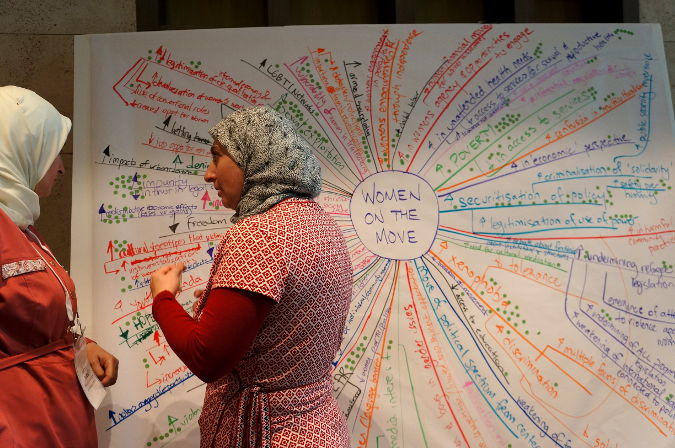
Ahead of the World Humanitarian Summit, UN Women and Oxfam gathered more than 50 refugee advocates from 15 countries in Europe, the Middle East and North Africa to formulate a joint position on how to respond to the challenges faced by refugee women and girls.
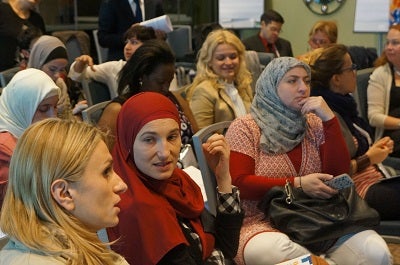
The Women on the Move workshop, held from 16-18 May in Istanbul, drew participants from a broad range of local and international NGOs and UN agencies who have been on the front-lines of the response to refugee movements created primarily by the conflicts in Syria and Iraq.
They discussed the impacts of current national and international policies on the movement of refugee women and found that many governments are failing in meeting their international obligations, especially to meet refugee women and girls’ needs for protection and asylum.
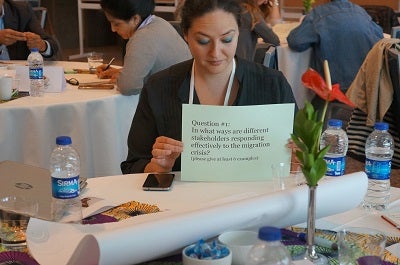
“The world’s current response to refugees doesn’t match women and girls’ needs,” said Meryem Aslan, Oxfam Country Director for Turkey, at the workshop: “But civil society is increasingly working together. Here attendees have together developed a set of common recommendations that will be shared at next week’s World Humanitarian Summit in Istanbul.”
Key recommendations for global leaders, detailed in this statement, include the need to:
- Address the root causes of the wars in Syria and Iraq;
- Ensure greater participation of refugees in programmes that affect them;
- Provide safe and legal passages for refugees and migrants;
- Establish more transparent, effective and accountable funding mechanisms to support refugees;
- Carry out more studies to better understand the positive impact of refugees/ migrants on host countries economies;
- Amplify the voices of activists supporting the rights of refugees and migrants.
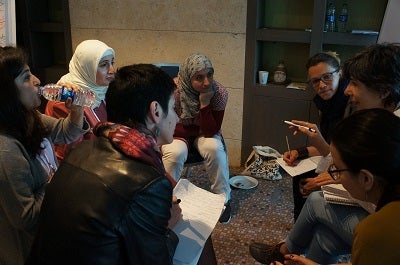
“Participants decried that governments are prioritizing border security over refugee rights,” said Sabine Freizer, UN Women Policy Advisor for Governance, Peace and Security for Europe and Central Asia: “They also agreed to work together in the coming months to counter xenophobia and advocate for policies and programmes that put refugees first.”
UN Women spoke to several of the participating civil society representatives to ask them about the biggest challenges they, and refugees, face and to ask what they’d say – if they could – to world leaders gathering at the World Humanitarian Summit on 23-24 May in Istanbul.
Here’s what they had to say*:
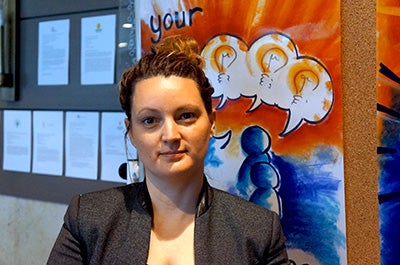
"Rethink your policies and decisions: They force refugee women and girls into the criminal underground economy and into smugglers’ hands. The people we see are not economic migrants. Many are simply trying to save their lives. They have no alternatives except to flee. Think about this, and act.” —Jelena Hrnjk, Atina, an NGO which provides direct support to hundreds of refugee women and girls, particularly those who've suffered gender-based violence and human trafficking, in Belgrade, Serbia.
Jelena has worked for six years at the NGO Atina, which provides direct support to hundreds of refugee women and girls in Serbia, particularly those who’ve suffered gender-based violence and human trafficking. Active for 13 years in Serbia, Atina’s mobile teams operate on Serbia’s borders with Hungary, Croatia and Macedonia. It has three safe, secret spaces to shelter women and girls under threat of violence and also provides programmes for girls who are not refugees. Atina’s challenges include the asylum system in Serbia and human trafficking victim-protection systems. Its main challenge now is to address refugee women and girls’ needs and how to protect them. “Services are not tailored for refugees, so our NGO customizes services to meet refugee women’s needs,” says Jelena.
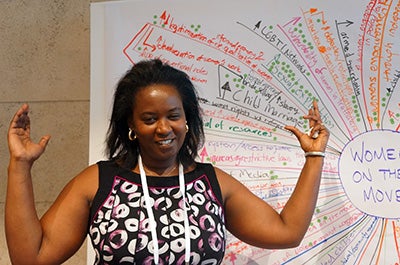
"Incorporate gender in planning humanitarian action. Women’s needs are very specific. Refugee women need your support so they can heal from the traumas they’ve experienced. Women must participate in all levels of decision-making.
People have different cultural backgrounds and ways of understanding what is out there. All frontline service providers should be sensitive to issues of culture, diversity, conflict and war,” —Salome Mutual, WEZESHA (empower or enable in Swahili), a diaspora-led organization, and the European Network of Migrant Women (ENoMW), a network of 20 organizations from 17 European countries that provides needs assessments of women on the move, both based in Dublin, Ireland.
They share the information collected with the Irish and other European governments. “The issues that keep coming up in our assessments—protection, service provisions—are those where the State takes the lead,” says Salome. “We try to get governments to understand the specific needs of women on the move. These women have gone through a lot: at home before they left, conflict for many, on the road, on arrival. You have to understand what they’ve gone through to properly plan a response.” ENoMW’s challenges include lack of political will and commitment to support refugee women’s needs. A lack of cultural competency in providing service complicates matters.
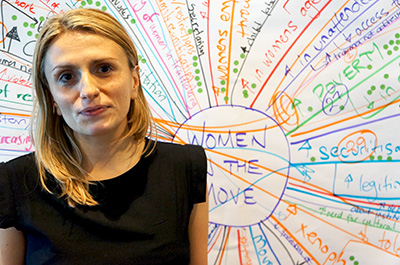
“Yes, you do have responsibility to protect the rights of refugee women, children and men, just as strongly as you protect your economic and geopolitical interests.” —Asja Korbar, editor and founding member of Are YOU SYrious?, an NGO that provides support and emergency aid—food, clothes, medicines, information, legal services—to “everybody”: refugees, asylum-seekers, migrants and other stranded people in Croatia.
Asja Korbar is founding member of the Are YOU SYrious assembly, an editor at its news digest, and active in the group’s development and access to education groups. Are YOU SYrious provides support and emergency aid—food, clothes, medicines, information, legal services—to “everybody”: refugees, asylum-seekers, migrants and other stranded people in Croatia. They have volunteers in Croatia and throughout Greece and along the Balkans migration route. Are YOU SYrious plays an important role in providing Information. Their daily news digest presents Syrian migrant information from Syria to Norway. Written in English and collected by refugees, volunteers and the media along the Balkans route, it is read online by 10-100,000 per day and is translated into Spanish, Arabic and Farsi.
The challenges faced by Are YOU SYrious include a rigid system, securitization of the refugee situation and an increasingly restricted legal and public space. “Burn-out is a challenge,” says Asja. “Are YOU SYrious positions are unpaid and members must support families and maintain their private and NGO space, and are often exposed to overwhelming, dramatic stories.”
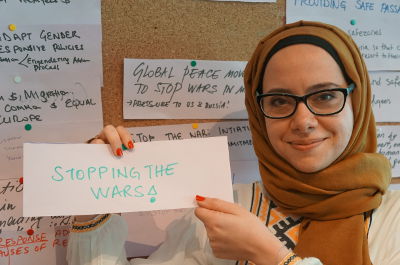
“Remember that a refugee is just like you and me.” - Rouba Mhaissen, SAWA Foundation UK and SAWA for Development and Aid, which works with refugee families to create sustainable communities in camps in Lebanon.
SAWA's mission is to turn beneficiaries into independent agents in their communities. It runs schools, bakeries, classes for tailors and barbers, literacy and technology classes, small economic empowerment projects—all run by refugees, for refugees.
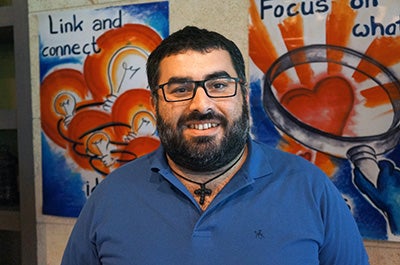
“Evolve or dissolve. The humanitarian system is badly failing the Syrian people. It is time to rethink this system not only for Syria but for all disasters around the world. Protect civilians, guarantee humanitarian access to difficult, besieged areas, and support Syrian civil society organizations.” —Fadi Hallisso, CEO and co-founder of Basmeh and Zeitooneh, which sets up open-door community centres in high-density, mainly urban areas, with programmes for refugees, including on protection, livelihoods, adult education, arts and culture, based in Beirut, Lebanon.
Basmeh and Zeitooneh means ‘a smile and an olive’, says Fadi Hallisso, its CEO and one of five founders. Fadi came to Lebanon from Syria in 2010 to study philosophy. When the Syrian conflict began, he and friends mobilised.
“We started as volunteers in Lebanon and Syria who wanted to respond to the crisis. So we decided to organize, and then scaled up from Lebanon into Turkey,” says Fadi. “Basmeh and Zeitooneh seeks to change the mentality in society, so we decided on a different approach. We focus on high density, mainly urban areas with refugees and set up open door community centres, with programs for women, men and families.“
An important aspect of Basmeh and Zeitooneh’s focus is to work with women. “Women are an entry to families and societies,” explains Fadi. “Once you gain their respect, you can reach their husbands and children. We provide a safe area for women; this encourages people to come and try our services.”
Fadi says that Basmeh and Zeitooneh’s special focus is on adult education, protection for the most vulnerable women and children, livelihoods, art and culture: “We start with basic needs – what they need, medical assistance – and then build up to fill gaps not filled by other organizations, and then develop more sophisticated programs such as civic engagement and art and culture clubs.”
Basmeh and Zeitooneh’s challenges arise from the constantly changing legislative environment in surrounding countries, the brain drain of talented people and funding.
“Long-term funding is always difficult, as is finding donors to fund our strategy rather than their programs. Most funding we get is for 6-8 months, while the need is much longer term. To give people hope so they’ll return to rebuild their country, they need to know that there will long term funding,” says Fadi.
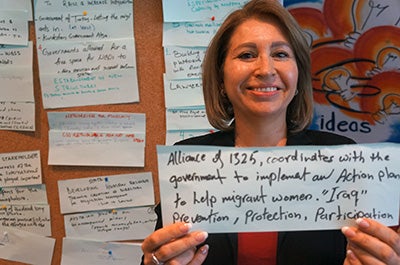
“Leaders must support women’s organizations as key players in the response to this catastrophe, as key players in dealing with victims. Enhance the partnership between government and civil society to develop this support. Remember: The women’s peace agenda should be your agenda …We must go ministry-by-ministry and to UN agencies and international organizations to put pressure on the government and to get funds to implement UNSCR 1325.” —Susan Aref, Women Empowerment Organization (WEO), an alliance that provides services to women refugees in several camps in Iraq, including social assistance, gender-based violence and legal services, and the distribution of humanitarian aid, while pressuring the government to implement UN Security Council resolution 1325, based in Erbil, Kurdistan Regional Government, Iraq
On behalf of the Women Empowerment Organization, Susan Aref coordinates an alliance to implement UN Security Council Resolution 1325 (UNSCR 1325), which requires parties in a conflict to prevent violations of women's rights, to support women's participation in peace negotiations and in post-conflict reconstruction, and to protect women and girls from sexual and gender-based violence in armed conflict.
WEO provides many services to women refugees in several camps in the Kurdish region and other provinces of Iraq. These include social assistance, sexual and gender-based violence and legal services, and the distribution of humanitarian aid. WEO works to fight early child marriage and raise awareness on fighting violence against women. They also work closely with governments to develop national action plans to endorse and implement UNSCR 1325.
WEO’s challenges include the loss of budgets for national and emergency action plans to implement UNSCR 1325 in Iraq and the Kurdish region.
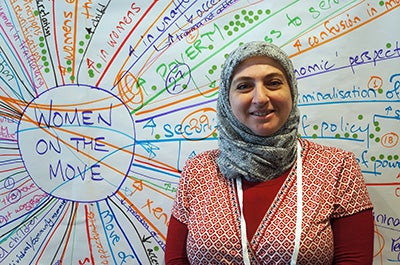
“The Syria crisis is not just a crisis in Syria. It has global impact, with more than 4 million refugees. The solution is not serving only those refugees because we have 6.7 million IDPs [internally displaced people] alone inside Syria, people who’ve moved more than once and who deserve services and safety. Ending the crisis is essential to eliminate suffering.” —Samah Bassas, CEO of the Syria Relief Network, an umbrella group of more than 60 organizations inside Syria and neighbouring countries (Turkey, Jordan, Lebanon and Iraq), and a coordinating hub for NGOs and organizations that deliver assistance to Syrians, based in Gaziantep, Turkey.
Samah is CEO of the Syria Relief Network, an umbrella group made up of more than 60 organizations inside Syria and its neighbouring countries of Turkey, Jordan, Lebanon and Iraq. In addition, the Syria Relief Network acts a field coordination platform for 85 grass-roots organizations. The Network coordinates a response for Syrian Crisis emergencies and coordinates with other networks and non-members. The Syrian Relief Network’s main objective is to act as a coordinating hub for NGOs and organizations that deliver assistance to Syrians and advocate for them.
Samah says the Network’s members’ challenges arise from the nature of the Syrian Crisis. “The Syrian crisis is the biggest since WWII. The need is big, and our challenge is very big,” says Samah. “Delivering humanitarian assistance and programmes in a fluid environment war zone where civilians, hospitals and service centres are being targeted and internally displaced persons (IDPs) are constantly moving is a big challenge.”
*Disclaimer: The views expressed here are of these participants and may not necessarily reflect those of UN Women.